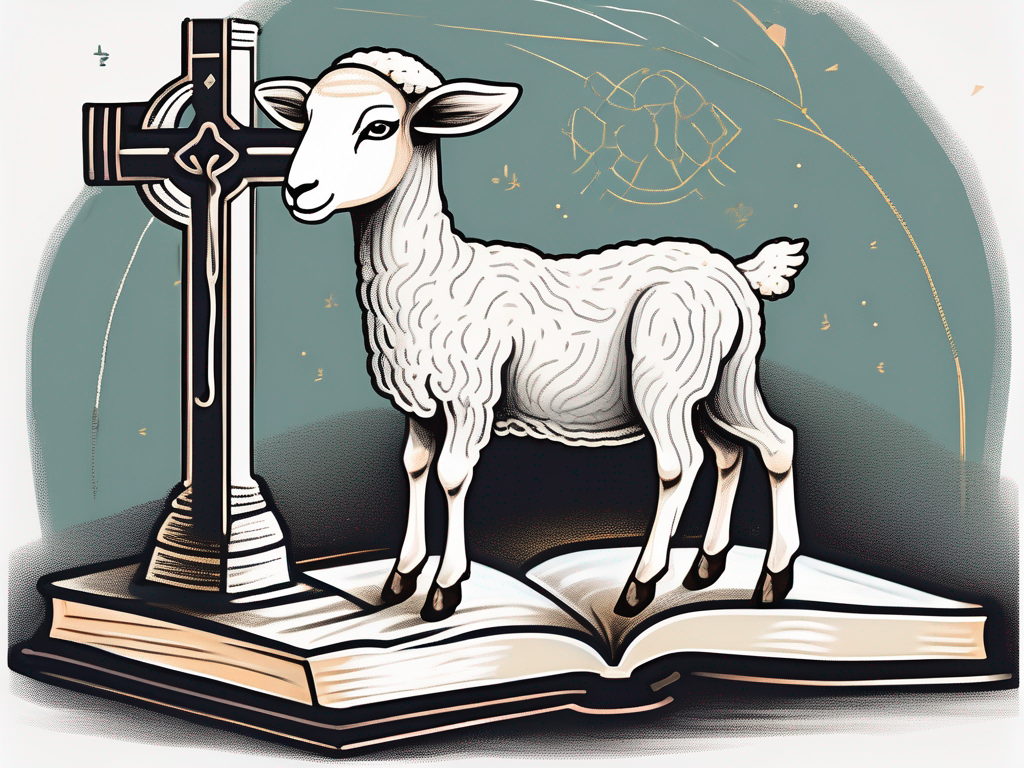Judaism is one of the oldest religions in the world, with a rich history and deep-rooted traditions. It spans thousands of years and has influenced the lives of millions of people around the globe. In this comprehensive guide, we will explore the basics of Judaism, its origins, core beliefs, rituals, and practices.
Understanding the Basics of Judaism
The Origins and History of Judaism
Judaism traces its roots back to ancient times, originating in the Middle East around 4000 years ago. It began with the patriarchs and matriarchs, such as Abraham, Sarah, Isaac, and Rachel. The story of their journey and the establishment of a covenant with God is documented in the Hebrew Bible or Tanakh.
Abraham, known as the father of Judaism, played a pivotal role in the faith’s development. He was called by God to leave his homeland and settle in the land of Canaan, which would later become the Promised Land for the Israelites. Abraham’s unwavering faith and obedience set the foundation for the Jewish people.
Over the centuries, Judaism has evolved, experiencing periods of triumph and turmoil. The Israelites faced numerous challenges, including the Babylonian exile, where they were forced to leave their homeland and live in captivity. Despite these hardships, the Jewish people managed to preserve their identity and traditions, passing them down through generations.
The destruction of the Second Temple in 70 CE was another significant event in Jewish history. This event marked the end of the centralized worship in Jerusalem and led to the development of synagogues as places of communal prayer and study.
The diaspora, the dispersion of Jews across the world, also played a crucial role in shaping Judaism. Throughout history, Jews have migrated to various countries, adapting to different cultures while maintaining their religious practices and traditions. This dispersion has contributed to the diversity and richness of Jewish culture.
Core Beliefs and Principles of Judaism
At the heart of Judaism are its core beliefs and principles, which guide the faith and the lives of its adherents. One fundamental belief is the existence of one God who created the universe and maintains an everlasting covenant with the Jewish people.
Judaism places a strong emphasis on ethical living and the pursuit of justice through acts of kindness and compassion. The concept of tikkun olam, repairing the world, is central to Jewish teachings, urging individuals to contribute positively to society.
In addition to ethical living, Judaism teaches the importance of study and intellectual growth. The pursuit of knowledge through the study of sacred texts, such as the Torah, is highly valued. Jewish scholars, known as rabbis, dedicate their lives to studying and interpreting the teachings of the Torah, providing guidance to the community.
Another core belief in Judaism is the concept of chosenness. Jews believe that they have been chosen by God to fulfill a unique role in the world, to be a light unto the nations. This belief instills a sense of responsibility and purpose within the Jewish community.
The Importance of the Torah in Judaism
The Torah, also known as the Five Books of Moses, is the central text of Judaism. It contains the foundational laws, ethical teachings, and narratives that shape Jewish life. The Torah is believed to have been received by Moses on Mount Sinai and serves as a guide for moral and spiritual conduct.
Studying the Torah is not limited to religious leaders; it is an integral part of Jewish education for people of all ages. Synagogues, Jewish schools, and homes are filled with the study and discussion of Torah and its interpretations. The Torah is divided into weekly portions, and each week, a new portion is read and explored, providing an opportunity for reflection and learning.
The study of Torah goes beyond the literal interpretation of its words. Jewish scholars engage in deep analysis and interpretation, seeking to uncover the hidden meanings and lessons contained within the text. This ongoing study and interpretation ensure that the Torah remains relevant and applicable to the ever-changing world.
Furthermore, the Torah serves as a source of inspiration and guidance for Jewish rituals and traditions. It provides the framework for observing the Sabbath, celebrating holidays, and conducting lifecycle events such as weddings and funerals.
In conclusion, Judaism is a rich and complex faith with a long history and deep-rooted traditions. Its origins in ancient times, core beliefs, and the importance of the Torah shape the lives of Jewish individuals and communities around the world. The continued study and practice of Judaism ensure its preservation and evolution for future generations.
The Different Branches of Judaism
Judaism, one of the oldest religions in the world, has evolved over time and branched into various sects, each with its own unique beliefs and practices. These branches, including Orthodox Judaism, Conservative Judaism, Reform Judaism, and Reconstructionist Judaism, offer different perspectives on Jewish law, tradition, and modernity.
Orthodox Judaism
Orthodox Judaism is considered the most traditional and conservative branch within Judaism. Its adherents adhere strictly to Jewish law and tradition, interpreting it in a literal sense. Orthodox Jews observe Sabbath, keep kosher, and follow the ancient rituals and customs.
Community and family are highly valued in Orthodox Judaism. Synagogues play a central role in religious life, serving as a gathering place for prayer, study, and social events. The synagogue becomes a hub of activity, fostering a sense of belonging and unity among its members.
Orthodox Jewish communities often have their own educational systems, with schools that prioritize religious studies alongside secular education. This emphasis on religious education helps to preserve Jewish traditions and ensure the continuity of Orthodox Judaism for future generations.
Conservative Judaism
Conservative Judaism emerged as a response to the challenges posed by modernity while maintaining a commitment to tradition. It seeks a balance between traditional observance and adapting to contemporary society.
Conservative Jews maintain a commitment to Jewish law and rituals, but with some flexibility. They believe in the importance of engaging with the modern world while preserving the core values and teachings of Judaism. This branch also promotes the inclusion of women in religious leadership roles and the affirmation of LGBTQ+ rights, reflecting a commitment to egalitarianism.
Conservative synagogues often provide a range of educational and cultural programs to engage their members. These programs may include adult education classes, social justice initiatives, and community outreach projects, all aimed at fostering a sense of belonging and connection within the congregation.
Reform Judaism
Reform Judaism is known for its progressive stance, advocating for changes in Jewish practices to adapt to modern times. It believes in the autonomy of the individual to interpret Jewish law and practice.
Reform Jews embrace a more inclusive approach, welcoming interfaith families and supporting gender equality in all aspects of Jewish life. Their worship services often incorporate English and modern music, creating a more accessible and contemporary religious experience.
Reform synagogues prioritize social justice and community engagement. They often engage in various charitable activities, such as food drives, volunteering at local shelters, and advocating for human rights. These efforts reflect the Reform Jewish commitment to repairing the world (tikkun olam) and making a positive impact on society.
Reconstructionist Judaism
Reconstructionist Judaism emphasizes the importance of evolving Jewish traditions to meet the needs of contemporary society. It holds that Jewish culture and community are central to the faith, rather than solely religious observance.
This branch views Judaism as an evolving civilization, encouraging its members to actively participate in shaping its future. Inclusivity, social justice, and embracing diversity are core values of Reconstructionist Judaism. Reconstructionist synagogues often prioritize open dialogue and democratic decision-making processes, allowing members to have a voice in shaping the community’s direction.
Reconstructionist Jews often engage in interfaith dialogue and collaborate with other religious and secular organizations to promote understanding and work towards common goals. They strive to create a Judaism that is relevant and meaningful in the modern world while staying connected to their rich heritage.
These different branches of Judaism offer diverse paths for individuals to connect with their Jewish identity and engage with their faith. While each branch has its own unique characteristics, they all share a common goal of preserving and enriching the Jewish tradition for future generations.
Jewish Rituals and Practices
The Significance of Shabbat
Shabbat, the Jewish day of rest, begins at sunset on Friday and ends at nightfall on Saturday. It is a time for Jews to cease from work and to focus on spirituality, family, and community.
Shabbat is celebrated through rituals such as lighting candles, reciting prayers, and sharing a festive meal with loved ones. It provides a space for reflection, rejuvenation, and reconnection with God and others.
Jewish Holidays and Festivals
Judaism is rich in holidays and festivals, each with its own significance and practices. These celebrations provide an opportunity to commemorate historical events, express gratitude, and reaffirm Jewish identity.
Pesach (Passover), Rosh Hashanah (Jewish New Year), Yom Kippur (Day of Atonement), and Hanukkah are among the most well-known Jewish holidays, each observed with unique rituals, prayers, and symbolic foods.
Dietary Laws: Kosher Foods
Kashrut, the Jewish dietary laws, dictate what is permissible to eat and how food should be prepared. Kosher foods are those that meet these requirements and are considered fit for consumption by observant Jews.
These laws include the prohibition of consuming certain animals, such as pork and shellfish, and the separation of meat and dairy products. The careful preparation and supervision of food are essential to maintaining a kosher diet.
The Role of Synagogue and Prayer in Judaism
Understanding Jewish Prayer Services
Prayer is an essential part of Jewish worship, connecting individuals to God and strengthening communal bonds. Jewish prayer services are conducted in synagogues, which are both sacred spaces and community centers.
Services often include recitation of prayers, singing of hymns, and the public reading of the Torah. Different prayer services are held throughout the week, with the most significant being Shabbat and holiday services.
The Importance of Bar and Bat Mitzvah
Bar and Bat Mitzvahs mark a significant milestone in the lives of Jewish boys and girls. At the age of 13 (for boys) and 12 (for girls), they become accountable for their actions and are considered adults in the eyes of Jewish law.
During the ceremony, the young person will read from the Torah and deliver a speech. It is a time of celebration and affirmation of Jewish identity, as well as a commitment to continuing Jewish learning and involvement.
In conclusion, Judaism encompasses a rich tapestry of history, beliefs, rituals, and practices. It is a faith that honors tradition while adapting to the needs of its followers. Whether it is the study of Torah, the observance of Shabbat, or the celebration of holidays, Judaism offers a meaningful and fulfilling way of life for millions of people around the world.












